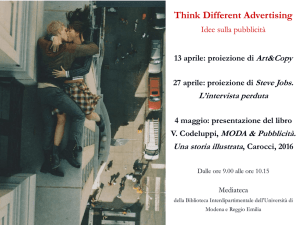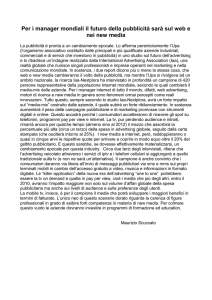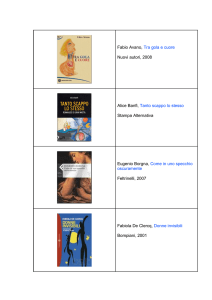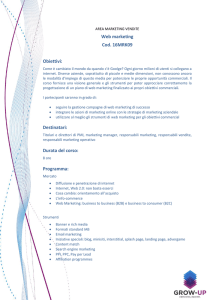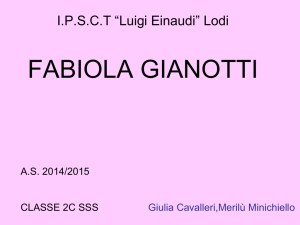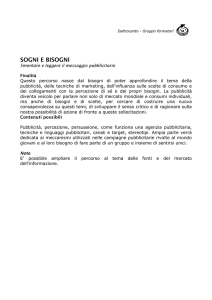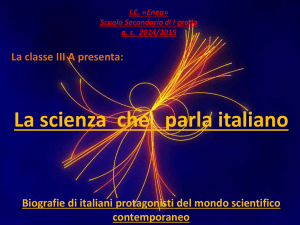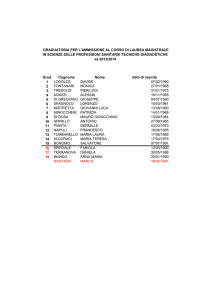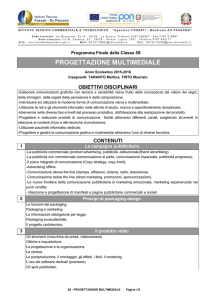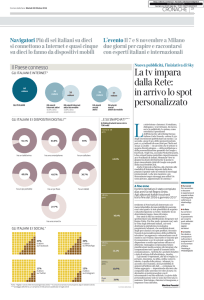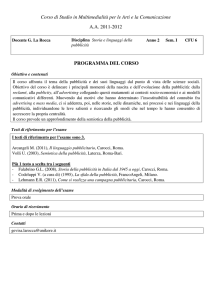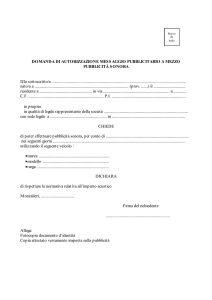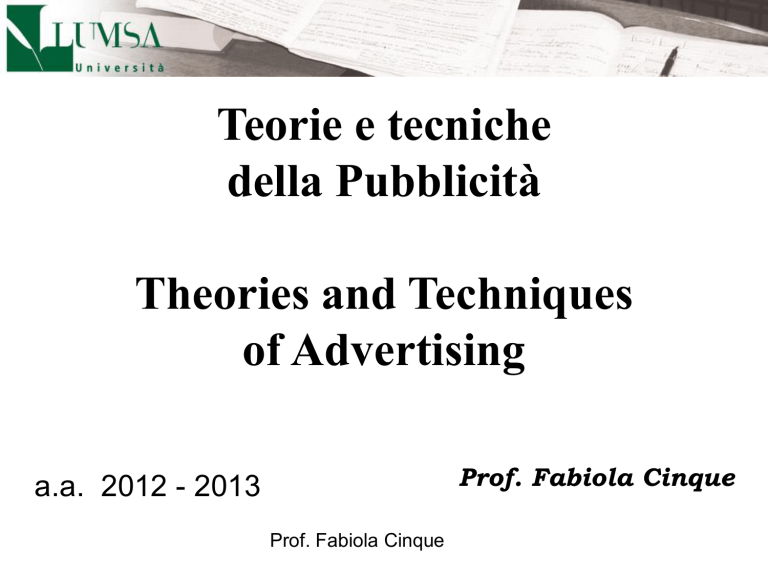
Teorie e tecniche
della Pubblicità
Theories and Techniques
of Advertising
Prof. Fabiola Cinque
a.a. 2012 - 2013
Prof. Fabiola Cinque
Lezione 1
LA NASCITA
DELLA STAMPA
The beginnings Press
Prof. Fabiola Cinque
When the industry develops and product are sold in several shops in the same city
so it's not enough anymore the sign outside the shop (botteghe) or the preople
shouting in the square.
.
The brands
are always been used since the ancient time (roman time, egyptian -
grece etc). The publicty are born when goods were produced in large quantities
and the producer and the byers are not in contact anymore.
We consider that modern advertising was born when the newspapers started to be
printed in the 19th century . Without the industry and the press commercial
information would have been just though graffiti on the wall, in the markets.
The advertising was born with the
press on 17th october 1492
Jean Dupres makes prints
the first Manifesto for a
celebration in Notre Dame.
Few years later Pierre Le Caron
publishes a short Manifesto
for the arrival
of Luigi XII in Paris.
Prof. Fabiola Cinque
Beside the few exeception books were the first good to be publicized
because the University in Paris asking bookshop to publish the list of
the books available with their price.
During the following three centuries there wasn't much development of the
advertising industry.
In the 18th century with the development of the industry, and in the 19th century
with the faster means of trasportation (steam machine, train etc) there is a
greater need and use of the commercial information and communication.
Culture doesn't belong to the aristocracy anymore and becames accesible to a
larger number of people.
At the beginnings press was used just for to print the Bible and the other
religious material.
The first printed publicity is introduced
in France at the end of the 19th century
and in England UK wich were the main
industrial countries in Europe.
Magazines and newspapers specialiced
like the “petit affiche” in France.
Prof. Fabiola Cinque
But is the 1836 De Girardin understands that to reduce the cost of
newspapers advertising has to be paied.
He understands that the circulation of newspapers
can be encreased by reducing it's cost-price.
And than decides that newspapers advertising
be a service should to be paied.
He created the 4th page, a whole page devoted to
advertisement.
The initiative of Girardin was a big scandal
because it was considered a betrayal
(tradimento) by real journalist.
Similar developments take place in London too: in
1861 the first “Sandwich Man” was seen.
When the underground was inaugurated the train
was covered with advertising posters.
Than the advertising comes out of the
newspapers and the conquers the city.
Prof. Fabiola Cinque
In France with a new colour printing tecnique “chromolithography”
starts the “Era Affiche”.
At the same time in Italy the two families Carlo Erba and Attilio Manzoni, that
comes from farmacy industry, set up – give start the first Concessionaria di
Pubblicità (Dealership) Media Planning Agency that still alive today.
At the end of the 19th century the word “Reclame” is used for the first time. Later
replaced by “Advertising”.
Advertising follows the industrial development and as a reult several Media
Planning Agency were established everywhere in the UK, France, Germany, as
well as in Italy.
In Paris, around 1836, at the time of De Girardin
(that we mentioned before) Mister Havas,
a banker in Paris, created-establishedthe first print agency in the word an afterwards
he offered “advertising space” in exchange
of suscription to his agency service. This new metod to sell advertising, this new
kind of advertising agencies spread in France under the name Regie.
Prof. Fabiola Cinque
The publicity
The publicity, as we know it, it is a product of the mass-media. It is
born in England in the '700 with the advent of the newspapers.
To the his/her first to appear, introduces him with small
announcements, the famous ones "classified", insertions that
publicize, in the sense that a news, creams, ointments,
medicines, miraculous lotions, chiromancy or a whole certain
band make public of produced by market that they see for the
first time the possibility to exist out of the road. But also used
things, utensils, machineries, small inventions make him space
among the lines.
Prof. Fabiola Cinque
3_Nascita della Pubblicità
La pubblicità, così come la conosciamo, è un prodotto dei mass-media. Nasce
in Inghilterra nel '700 con l'avvento dei giornali. Al suo primo apparire, si
presenta con piccoli annunci, i famosi “classified”, inserzioni che
pubblicizzano, nel senso che rendono pubblica una notizia, creme,
unguenti, farmaci, lozioni miracolose, chiromanzia ovvero tutta una certa
fascia di prodotti da mercato che vedono per la prima volta la possibilità di
esistere fuori della strada. Ma anche cose usate, attrezzi, macchinari,
piccole invenzioni si fanno spazio tra le righe.
Il lettore viene a conoscenza che esiste quello che cerca, poco lontano da
casa, ad un prezzo da vero affare. Il mercato acquista così velocità, l'
economia ne approfitta, le merci girano come mai prima. Pian piano gli
annunci coprono sempre una più vasta area di mercato fino a diventare un
affare per lo stesso giornale che li ospita. In questo periodo la pubblicità
contribuisce notevolmente alla nascente democrazia in quanto rende alla
portata di tutti il privilegio dell'informazione, chiunque può fare un annuncio,
diventare visibile, entrare nel mercato senza strutture intermedie e selettive,
inoltre funziona come un acceleratore verso il processo di
industrializzazione.
Prof. Fabiola Cinque
The reader comes to knowledge that exists what looks for, few away
from house, to a price from true bargain.
The market purchases so speed, the economy takes advantage of it,
the commodities turn how come before. Plain Plan announces him
they always cover a vast area of market up to become a bargain for
the same newspaper that entertains them.
In this period the publicity contributes notably to the dawning
democracy in how much it makes to the course of the whole
privilege of the information, whoever can make an announcement,
to become visible, to enter the market without intermediary and
selective structures, works besides as an accelerator toward the
process of industrialization.
Prof. Fabiola Cinque
In this period the publicity
Without the publicity the so-called industrial revolution surely his would have
delayed to appear. It is a heroic moment. announce him they trace the
structure of the newspaper, pre-feels him as 'news', novelty to the service of
the public.
Subsequently, thanks to the development of the competition, he evolves and it
passes from the phase dell'informazione to that of the persuasion, to
convince the reader of the quality of the publicized products. It is in this
period that the publicity discovers the art of the reasoning and rehabilitates
the rhetoric as powerful persuasive and demonstrative tool. The regime of
competition that the same publicity had created, it produces a new need,
that to distinguish from the competitors
Prof. Fabiola Cinque
Senza la pubblicità la cosiddetta rivoluzione industriale avrebbe sicuramente
ritardato il suo apparire. È un momento eroico,.gli annunci ricalcano la
struttura del giornale, si pre-sentano come 'notizie', novità al servizio del
pubblico. In seguito, grazie allo sviluppo della concorrenza, si evolve e passa
dalla fase del-l'informazione a quella della persuasione, al convincere il
lettore della qualità dei prodotti pubblicizzati. È in questo periodo che la
pubblicità scopre l'arte dell'argomentazione e riabilita la retorica come
potente strumento persuasivo e dimostrativo. Il regime di concorrenza che la
stessa pubblicità aveva creato, genera un nuovo bisogno, quello di
distinguersi dai concorrenti.
l bisogno di farsi notare e di essere diversi dagli altri inaugura una nuova fase
evolutiva della pubblicità quella della complicità fra prodotto e consumatore,
in una parola: la seduzione. Seduzione è un corteggiamento, il prodotto
diventa non solo utile ma anche simpatico, con la stessa visione del mondo,
diventa uno stile di vita a cui chi compra aderisce. Per ottenere consenso, la
pubblicità riscopre anche la potenza evocativa dell'elocuzione, delle figure
retoriche che, prese a prestito dalla poesia, cominciano a lavorare nel
territorio della prosa fornendo al mercato non solo argomenti ma soluzioni
linguistiche nuove e accattivanti, nasce la creatività.
Prof. Fabiola Cinque
creativeness is born
The need to make to be noticed and to be different from the other ones
inaugurates a new evolutionary phase of the publicity that the
complicity between product and consumer, in a word: the seduction.
Seduction is a courting, the product becomes not only useful but
also nice, with the same vision of the world, it becomes a style of life
to which who purchase sticks. To get consent, the publicity also
rediscovers the evocative power of the elocution, of the rhetorical
figures that, taken to loan by the poetry, they start to work in the
territory of the prose not only furnishing to the market you deduce
but linguistic solutions new and winning, creativeness is born
Prof. Fabiola Cinque
Last century has been
the century of the publicity.
Since then the publicity from humble handmaid of the mass-media
progressively owner of the same becomes up to the point of
sponsor the whole system of the media that, alone you would
not be able to survive.
Without the good news of the publicity there would be the silence,
any communication, any market.
Last century has been the century of the publicity.
From the years '50 in then, also in Italy, you is assisted to a
progressive development of the communication.
In USA very first.
Prof. Fabiola Cinque
Da allora la pubblicità da umile ancella dei mass-media diventa
progressivamente padrona degli stessi fino al punto di
sponsorizzare l'intero sistema dei media che, da solo, non sarebbe
in grado di sopravvivere. Senza la buona notizia della pubblicità ci
sarebbe il silenzio, nessuna comunicazione, nessun mercato. Il
secolo scorso è stato il secolo della pubblicità. Dagli anni '50 in poi,
anche in Italia, si è assistito ad un progressivo sviluppo della
comunicazione. Negli USA molto prima.
Siamo all'inizio del secolo e già alcuni prodotti vengono pubblicizzati su
larga scala dai mass-media: giornali e radiofonia. Le più importanti
multinazionali, nel corso del secolo, si impongono nel mercato
globale attraverso argomenti persuasivi, promesse e stili di vita, in
una parola: la retorica. Il nascente marketing studia il mercato e
consumatori, riscopre così la retorica, la plasma per i suoi obiettivi,
la rinnova anche nel linguaggio e se ne impossessa in tutti i suoi
aspetti.
Prof. Fabiola Cinque
We are to the beginning of the century and some
products are already publicized on wide staircase by
the mass-media: newspapers and radiofonia.
The most important multinational, during the century,
they impose him in the global market through
persuasive matters, promises and styles of life, in a
word: the rhetoric.
The dawning marketing studies the market and
consumers, it rediscovers so the rhetoric, moulds it
for its objectives, it also renews her/it in the
language and it takes possession in all of its
aspects.
Prof. Fabiola Cinque

